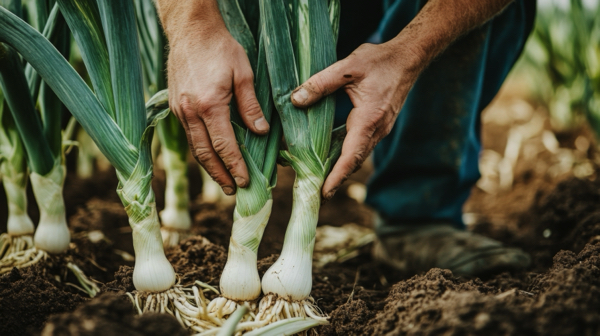
When talking about allium vegetables, garlic and onions often take the spotlight. But quietly making its mark as a superfood is the humble leek – an allium vegetable that deserves more attention for its impressive nutrient profile and health benefits.
Often overshadowed by its pungent relatives, leek (Allium ampeloprasum) offers a milder flavor, remarkable versatility in the kitchen and a growing body of research that suggests it can contribute to better health and wellness.
Leeks are part of the same family as chives, garlic, onions, scallions and shallots, but they stand out with their long, cylindrical shape and milder, slightly sweet flavor. Unlike the bold, assertive taste of garlic or onions, leeks add a delicate onion-like aroma to dishes, making them a favorite in soups, stews and stir-fries. Both their white base and tender green tops are edible, although the tougher dark green leaves are often reserved for flavoring broths and stocks.
A nutritional powerhouse
A one-cup serving of cooked leeks only contains about 31 calories but delivers an impressive array of vitamins and minerals. They are particularly rich in vitamin C, an essential nutrient for blood clotting and bone health, as well as manganese, which supports metabolic and nervous system function. They also provide notable amounts of vitamins A and B9 (folate) and copper.
One key nutrient advantage of leeks is their abundance of plant-based compounds, including carotenoids, flavonoids and sulfur compounds. These bioactive molecules play a role in many of leeks' potential health benefits.
Emerging studies are shedding light on the unique compounds in leeks and how they might contribute to better health.
Antioxidant
Leeks are rich in antioxidants, which are molecules that combat oxidative stress – a process that can damage cells and contribute to aging and chronic diseases. Key antioxidants in leeks include carotenoids, kaempferol, quercetin and vitamin C.
Carotenoids, such as lutein and zeaxanthin, are pigments that not only support eye health but also scavenge free radicals – offering additional protection to brain and heart tissues.
Kaempferol, in particular, has been shown to reduce inflammation against oxidative damage, which may support cardiovascular health. Quercetin, another flavonoid, is being studied for its ability to lower blood pressure and improve heart health by reducing inflammation and improving blood vessel function.
Vitamin C, a well-known antioxidant, helps regenerate other antioxidants and supports overall immune health.
Anti-inflammatory
Flavonoids like kaempferol and quercetin, inhibit inflammatory pathways – reducing the production of inflammatory cytokines and enzymes.
Sulfur compounds, such as allicin and diallyl disulfide, modulate inflammatory responses by suppressing oxidative stress and supporting antioxidant compounds.
Antibacterial
Sulfur-containing compounds in leeks, such as allicin and ajoene, are substances that disrupt bacterial cell membranes, interfere with essential processes and inhibit bacterial biofilm formation, making it harder for pathogens to thrive.
Research has shown leeks to be effective against common bacteria, such as Escherichia coli and Staphylococcus aureus. Their antibacterial activity extends to food safety and gut health, offering protection against foodborne illnesses and helping to maintain a balanced microbiome.
Anticancer
Flavonoids like kaempferol and quercetin protect DNA from oxidative damage, inhibit tumor growth and reduce inflammation –factors that are often involved in cancer progression.
Sulfur compounds like diallyl trisulfide and S-allyl cysteine are known to promote apoptosis (programmed cell death) in cancer cells and inhibit angiogenesis (the growth of new blood vessels that tumors needs).
By fostering a healthy gut microbiome, leeks indirectly support the body's ability to metabolize toxins and reduce inflammation in the digestive tract, particularly protecting against colorectal cancer.
Anti-obesity
Fructooligosaccharides, a prebiotic in leeks, not only improve gut health but also stimulate the release of satiety hormones released by fat cells like leptin, which signals your brain that you've had enough food.
Kaempferol and quercetin help regulate lipid (fat) metabolism, promoting fat breakdown and preventing fat accumulation. Sulfur compounds like allicin enhance insulin sensitivity and stabilize blood sugar levels – both of which play important roles in maintaining a healthy weight.
Learn more about superfoods like leeks at Superfoods.news.
Watch this video about the benefits and side effects of leeks.
This video is from the Daily Videos channel on Brighteon.com.
More related stories:
Leeks contain anti-cancer compounds.
STUDY: Eating foods high in flavonols (like quercetin) can help you stay strong as you age.
Traditional Chinese medicine treats sickness by restoring an individual's life force energy.
Sources include:
PMC.NCBI.NLM.NIH.gov
Health.com
Brighteon.com
Source link

